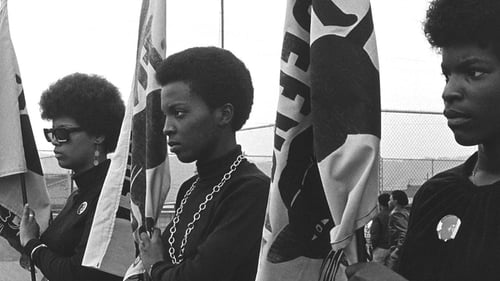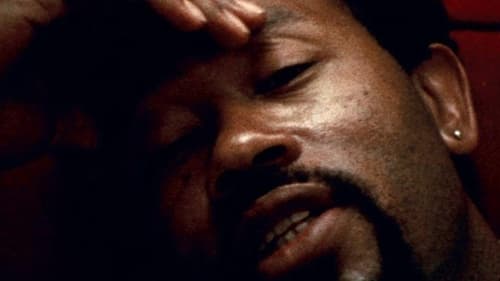Eldridge Cleaver
Nascimento : 1935-08-31, Wabbaseka, Arkansas, USA
Morte : 1998-05-01
História
Leroy Eldridge Cleaver was an American writer and political activist who became an early leader of the Black Panther Party. In 1968, Cleaver wrote Soul on Ice, a collection of essays that, at the time of its publication, was praised by The New York Times Book Review as "brilliant and revealing".

Self - Black Panther Party (archive footage)
A história dos Panteras Negras é frequentemente contada em uma porção de partes reembaladas, muitas vezes representando relatos trágicos e míticos de violência e atividade criminosa. O mestre documentarista Stanley Nelson vai direto à fonte, tecendo um tesouro de filmagens raras com as vozes das pessoas que estavam lá: policiais, informantes do FBI, jornalistas, apoiadores e detratores brancos, e Panteras Negras que permaneceram fiéis ao partido e àqueles quem saiu. Uma história essencial, Os Panteras Negras: Vanguarda da Revolução, é uma crônica vibrante, humana, viva e respirante desse movimento crucial que deu origem a uma nova cultura revolucionária na América.

A Huey P. Newton Story is a 2001 film directed by Spike Lee. It is a filmed performance of Roger Guenveur Smith's one-man show of the same name. Smith sits in a chair on a stage and tells about the past, mostly dealing with Huey P. Newton's life and times.

Self
In March 1997, social activist, former Black Panther, and author, Eldridge Cleaver sat down with Henry Louis Gates Jr. for a discussion of his life as a civil rights activist. It would be the last major interview Cleaver gave before his death in May 1998. This film draws on the 1997 interview, archival footage, and commentary from Cleaver's former wife Kathleen, as well as audio tapes of a 1975 interview that Gates did with Cleaver in Paris.

Self (archive footage)
Using government documents, archive footage and direct interviews with activists and former FBI/CIA officers, All Power to the People documents the history of race relations and the Civil Rights Movement in the United States during the 1960s and 70s. Covering the history of slavery, civil-rights activists, political assassinations and exploring the methods used to divide and destroy key figures of movements by government forces, the film then contrasts into Reagan-Era events, privacy threats from new technologies and the failure of the “War on Drugs”, forming a comprehensive view of the goals, aspirations and ultimate demise of the Civil Rights Movement…

Self
This special three-part presentation of "Like It Is" examines the history of the black civil rights movement in the United States, emphasizing the role of black leaders and activists. Including the defected FBi-agent "Othello" Darthard Perry tells it all.

Self (archive footage)
James Earl Jones narrates this fascinating and moving documentary about the life of the assassinated black leader through various sources.

Self
Lighter and livelier than the films Jean-Luc Godard had made in France, his U.S. collaboration with Direct Cinema documentarian D. A. Pennebaker was meant to be One A.M., as in “one American movie”; but Godard quit the project and the U.S., where to his dismay he discovered that revolution wasn’t imminent, and Pennebaker edited Godard’s material, to which he and Richard Leacock even added a bit more, releasing the result as One P.M., as in “one parallel movie.” It’s a stunning mixture of cinéma-vérité, political theater, and interviews of key sixties figures.

An absolute unknown work among Marker’s collaborations, made by filmmakers Bill Stephens, Paul and Carole Roussopoulas with Eldridge and Kathleen Cleaver, Congo Oyé was never completed and long-believed lost by all involved.

Self
The portrait of Eldridge Cleaver, the "Minister of Information" for the Black Panthers movement, in exile in Algiers.

Documentary about the West Coast Black Panthers, the deadly crackdown by the FBI and police forces.

The important L.A. Newsreel film about the Black Panthers that was rediscovered and written about by USC professor David James. Featured in the film is rare footage of many of the important West Coast Panthers such as Masai Hewitt, David Hilliard, Alprentice “Bunchy” Carter, Eldridge Cleaver, John Huggins, and as well as footage of the aftermath of the LAPD raid on the Los Angeles Panther Headquarters. Musically the film begins with the opening jazz music by Ornette Coleman and later features the call to arms anthem, “The End of Silence” written and sung by Panther Elaine Brown.

Self
A film shot during the summer of 1968 in Oakland, California around the meetings organised by the Black Panthers Party to free Huey Newton, one of their leaders, and to turn his trial into a political debate. They tried and succeeded in catching America’s attention.

A compelling document of the Black Panther Party leadership in 1967. This film contains a prison interview with Minister of Defense Huey P. Newton as well as an interview with Minister of Information Eldridge Cleaver, footage of the aftermath of the police assault against the Los Angeles Chapter headquarters, demonstrations to free Huey at Hutton Memorial Park and the Alameda County Court House and a recitation of the party's Ten-Point Platform by co-founder Bobby Seale. Newsreel's 19th, and one of their most widely distributed films, it was originally released as "Off the Pig," but has since seen release under the name Black Panther. This short film features drawings from activist artist Emory Douglas.






